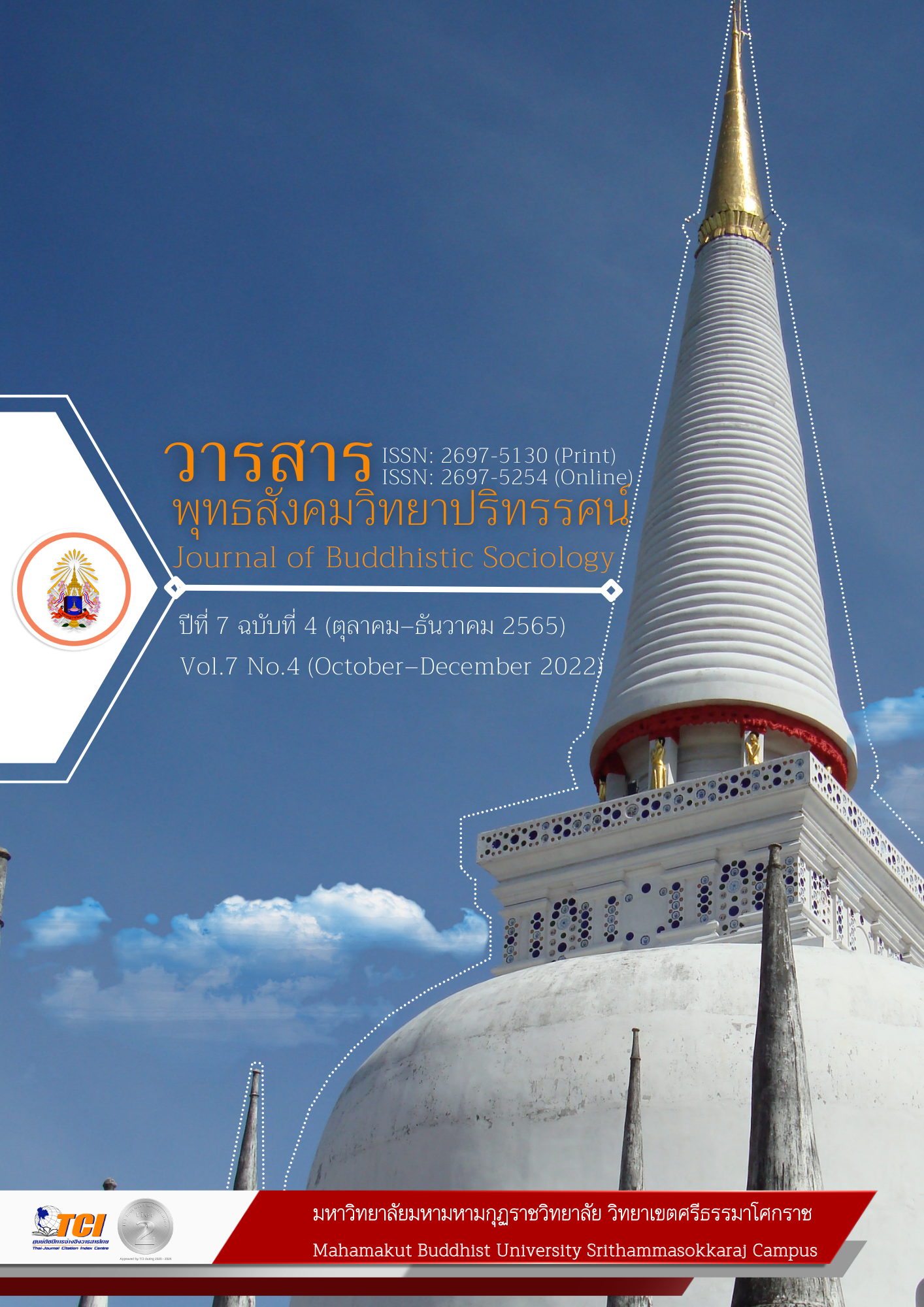INTEGRATED BUDDHISM FOR ADMINISTRATION EFFECTIVENESS DEVELOPMENT OF CITY MUNICIPALITIES IN CHONBURI PROVINCE
Main Article Content
Abstract
This research aimed to 1) study the administrative effectiveness of municipalities in Chonburi Province, 2) study factors affecting the administrative effectiveness of municipalities in Chonburi Province, and 3) present an integrated Buddhist model for the development of community administration. Mixed research was employed in this research. The researcher used a questionnaire for quantitative research to collect the data from a sample group, the personnel from 10 municipalities in Chonburi Province, totaling 3,036 people. Data were analyzed using frequency, percentage, mean, standard deviation, and confirmatory factor analysis (CFA). The researcher employed in-depth interviews with 17 key informants or face-to-face interviews for qualitative research. Data were analyzed using descriptive content analysis and focus group discussion of nine people on confirming data synthesis.
The research showed that;
- Overall, administrative effectiveness was high.
- Factor of administration and administrative motivation through the four paths of accomplishment principle affected the overall administrative effectiveness at 68%.
- For the integrated Buddhist model for community administration development, there were two primary factors to improve administrative effectiveness: administrative motivation and the current administration. Applying the four paths of accomplishment (Four Rddhippada) could promote more effective administration.
Article Details

This work is licensed under a Creative Commons Attribution-NonCommercial-NoDerivatives 4.0 International License.
References
กนก วงษ์ตระหน่าน. (2528). การเมืองในระบอบประชาธิปไตย ฉบับปรับปรุง. กรุงเทพมหานคร: โรงพิมพ์จุฬาลงกรณ์มหาวิทยาลัย.
เจตน์ ตันติวณิชชานนท์. (2557). บทบาทของพระพุทธศาสนาในการพัฒนาชาติ : มุมมองของอาจารย์ป๋วย อึ๊งภากรณ์. วารสารสันติศึกษาปริทรรศน์, 4(2), 341-355.
ฑิฆัมพร ชุลีลัง. (2550). ตัวแบบการวัดผลสัมฤทธิ์ในการทำงานของเทศบาล: การศึกษาเปรียบเทียบระหว่างเทศบาล 3 ขนาด. วารสารรัฐประศาสนศาสตร์ สถาบันบัณฑิตพัฒนบริหารศาสตร์, 5(4), 113-146.
ณัฐวัฒน์ สิริพรวุฒิ. (2556). การจัดการภาครัฐแนวใหม่ในการบริหารองค์การปกครองท้องถิ่น. กรุงเทพมหานคร: โรงพิมพ์ทิพย์วิสุทธิ์.
ทรงราชย์ ไชยญาติ. (2553). ประสิทธิผลการบริหารจัดการของศูนย์สุขภาพชุมชน จังหวัดเชียงใหม่. ใน วิทยานิพนธ์ปรัชญาดุษฎีบัณฑิต. มหาวิทยาลัยแม่โจ้.
ธิติวุฒิ หมั่นมี. (2561). ภาวะผู้นำการบริหารกิจการบ้านเมืองที่ดีขององค์กรปกครองส่วนท้องถิ่น. วารสาร มจร สังคมศาสตร์ปริทรรศน์, 7(3), 298-314.
ปัณณพงศ์ วงศ์ณาศรี. (2560). วิเคราะห์บริบทความท้าทายขององค์กรปกครองส่วนท้องถิ่นในการบริหาร ท้องถิ่นเพื่อขับเคลื่อนนวัตกรรมท้องถิ่นในยุคไทยแลนด์ 4.0. สารอาศรมวัฒนธรรมวลัยลักษณ์, 17(1), 63-77.
พระครูอุทัยสุตกิจ. (2558). ความสำเร็จของการบริหารงานตามหลักอิทธิบาทสี่ของพระสงฆ์ในการเผยแผ่พระพุทธศาสนาในเขตพื้นที่จังหวัดอุทัยธานี. วารสารสมาคมนักวิจัย, 20(2), 161-171.
ราชกิจจานุเบกษา. (2546). พระราชกฤษฎีกาว่าด้วยหลักเกณฑ์และวิธีการบริหารกิจการบ้านเมืองที่ดี พ.ศ. 2546. เรียกใช้เมื่อ 20 กรกฎาคม 2564 จาก https://ssc.onab.go.th/th/content/category/detail/id/7/iid/6581
สมคิด เลิศไพฑูรย์. (2557). กฎหมายการปกครองท้องถิ่น. กรุงเทพมหานคร: สำนักพิมพ์คณะรัฐมนตรี.
สำนักงานการส่งเสริมการปกครองท้องถิ่นจังหวัดชลบุรี. (2563). แผนพัฒนาส่งเสริมการปกครองท้องถิ่นจังหวัดชลบุรี. เรียกใช้เมื่อ 16 มิถุนายน 2563 จาก http://oldweb.chonburilocal.go.th.


